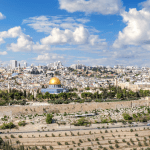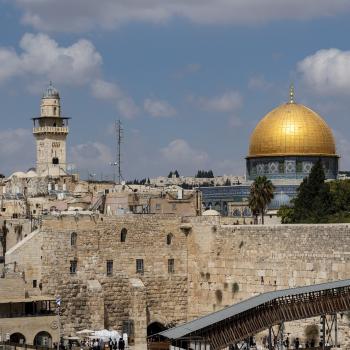Monday: Read Acts 4:1-31
Acts 4 opens by noting that while the disciples were still speaking (1), some of the leaders of the Sanhedrin (the Jewish supreme court) came to them (NB: It just so happened that all of those listed by Luke in 4:1 were Sadducees). Now, as far as we can tell, the Sadducees, who were largely members of the aristocracy, did not believe in the resurrection or in life after death.
This is why, as we will see, the primary focus of the speeches in the book of Acts is the resurrection. Paul, in his speech in Acts 26, makes special note of the fact that he is a Pharisee (26:5) and that he is on trial for his belief in the resurrection (26:6-8). In doing this, Paul was likely pitting the Sadducees and the Pharisees against one another.
The authorities are not sure what to do with the Christians. They know that the man who had been lame for 40 years (22) was healed by Peter and John (14; 3:1-10). They could not deny this. The problem for them was accentuated by the fact that Peter and John attributed their ability to heal the man to Jesus, whom they claimed was the fulfillment of the promised new temple (11; Ps 118:22), and that salvation was found in no one but Him (12).
The authorities decide to threaten the disciples and warn them not to “speak or teach at all in the name of Jesus” (18). The disciples’ reply establishes the classic Christian response to a government’s decree demanding the people of God not fulfill their divine commission to promote the Name of Jesus: “Whether it is right in the sight of God to give heed to you rather than to God, you be the judge; for we cannot stop speaking about what we have seen and heard” (19-20).
With the decision to disobey the governing authorities comes the decision to suffer the consequences. The early Christians do just that in 5:17-42.
Questions to ponder/discuss:
- Civil disobedience has a long and varied history in Christianity. To this day there are many Christians who continue to follow Jesus even though it is illegal in their country. Though most Christians pray that God would change the laws in these countries and legalize Christianity, history shows that the church has flourished more in countries where it is outlawed. Perhaps our prayers should be that God would strengthen and equip our brothers and sisters in these countries with wisdom so that they can be faithful to the Gospel and with the ability to persevere in their affliction. Pray for the church in Iran, Indonesia, China, and parts of Africa today!
Tuesday: Read Acts 4:32-5:32
The description of the Christians selling their lands and supporting one another is a direct allusion to Deut 15:4: “there was not a needy person among them” (34). This is precisely what biblical “justice” looks like. That they were selling some of their land (34, 36-37), however, is astonishing. The OT makes no provisions for selling land.
It may have been that those who had “much” land sold some of it in order to provide for the community. This raises the question as to how they obtained “much” land? The nature of the ancient world, especially for those within Judaism, is such that they could only have acquired land at the expense of others—i.e., that they have extra land means that someone else doesn’t have any.
By selling their lands and giving to those who had need within the community, the Christians were in effect repenting and doing what Jesus told the “Rich young ruler” do to (Luke 18:18-23).
We must be careful not to overly glamourize the nature of the church. They had plenty of struggles. The story of Ananias and Sapphira illustrates just that. The Christians were those who were “filled with the Holy Spirit” (4:31). Ananias and Sapphira, however, allowed Satan to fill their heart (3).
Questions to ponder/discuss:
- It is easy for us to glamourize the stories of Acts and admire the early church. But the reality is that they struggled mightily. How hard do you think it was for the Christians to preach in Jerusalem and Judea when their own families and friends were turning away from them? How hard do you think it was to sell their land and give to the community?—this was the equivalent of cashing out one’s retirement account.
Wednesday: Read Acts 5:33-6:15
Luke does not shy away from acknowledging problems within the Christian community. The failure to provide for those in need among the Hellenistic Jewish Christians (1) affirms the presence of ethnic tension. Hellenistic Jews are those who have assimilated into the broader Roman/Greek culture: they spoke Greek, wore Greek clothing, etc.
It is likely that the Hebraic Jewish Christians considered themselves more spiritual than the Hellenistic Jews who had “compromised” with the broader culture. (note: The questions of Church and culture are age old questions. That Luke doesn’t provide an answer as to who was right in this dispute may well indicate that there is not a “Christian” answer).
The dispute is resolved with the formation of the office of “deacon”/”servants” (3-6).
Luke notes that many “priests were becoming obedient to the faith” (7). Here is another reason why our assumptions that the Pharisees (which we assume that the priests Luke describes here were members of) were always the bad guys is mistaken.
The early Christians were distinguished by their preaching of the resurrection and that Jesus was the temple of God (11, 13). The first issue divided the Sadducees from the Pharisees and gave the Christians an inroad among the Pharisees over and above the Sadducees.
The Christian preaching that the Jerusalem temple was no longer needed, however, was quite problematic. The temple was central to Jewish beliefs and practices.[2] It was not just the center of their religion, but also of their civic life.
This leads to Stephen’s conflict with various Jewish leaders—that some of these leaders were from Cilicia (9) is Luke’s way of alerting the reader that the group with whom Stephen comes into debate certainly included the most famous of all—Saul, aka “Paul” of Tarsus, which was a leading city of Cilicia.
Questions to ponder/discuss:
- Because Christianity is inherently multi-cultural there is a demand for us to lay aside our preferences for the sake of the community. This doesn’t mean that we have to deny our cultural heritage or cease practicing our family and national traditions. It does mean, however, that we must respect those from other traditions and their freedoms and rights. It also means that we must never consider one set of preferences as superior to another. Make an effort to seek out Christians in your community that are culturally distinct from you (do a google search and learn what Christian groups are in your area). Then connect with them and learn their stories. You will be blessed, and they will certainly appreciate that someone cares.
Thursday: Read Acts 7
Stephen’s speech before the Sanhedrin (6:12) is a retelling of the OT story.[3] Stephen, of course, retells the story through the lens of Jesus. For Stephen, the question is whether or not Jesus is the temple of God.
Stephen begins by noting that God appeared to Abraham in Mesopotamia (2). That is, God appeared to Abraham outside of the land of promise and before there was a temple! In addition, God was with Joseph while he was in Egypt (9).
Stephen then tells of God’s appearing to Moses on Mt Sinai (30-33)—again indicating that God appeared outside of the land of promise and before there was a tabernacle.
When Stephen details Solomon’s building of the temple he notes, “However, the Most High does not dwell in houses made by human hands; as the prophet says: ‘Heaven is My throne, and earth is the footstool of My feet; what kind of house will you build for Me?’ says the Lord” (48-49; citing Isa 66:1).
The Temple, in other words, transcends a building because God transcends creation.
Stephen concludes by noting that, “you are doing just as your fathers did. Which one of the prophets did your fathers not persecute? They killed those who had previously announced the coming of the Righteous One, whose betrayers and murderers you have now become” (51-52).
As a result, Stephen becomes the first martyr. One cannot miss the fact that Luke depicts Stephen’s death in a manner that reminds his readers of Jesus’ death. Thus, while on the cross, Jesus says, “Father into Your hands I commit My spirit” (Luke 23:46; citing Ps 31:5). So also, Stephen cries out, “Lord Jesus, receive my spirit” (59). And just as Jesus asked the Father, “forgive them; for they do not know what they are doing” (Luke 23:34), so Stephen asks, “Lord, do not hold this sin against them” (60).
Questions to ponder/discuss:
- The wisdom of the disciples in their arguments with the authorities and the wisdom of Stephen here is the fulfillment of Jesus’ words to the apostles, “So make up your minds not to prepare beforehand to defend yourselves; for I will give you utterance and wisdom which none of your opponents will be able to resist or refute” (Luke 21:14-15; cf Mark 13:11). In Mark’s account, it is the Holy Spirit who will give them the wisdom to respond.
NB: this does not mean that we should not prepare speeches or sermons (as it is understood by some). It simply means that when we are arrested and brought before the authorities we can rely on the Holy Spirit for wisdom.
We must remember, however, that our words will not be heard if our actions and countenance do not also display love and grace. Note: Stephen looked like “an angel” when he was arguing with them (6:15).
Friday: Read Acts 8
Our introduction to perhaps the most important person in the NT behind Jesus (though some would say behind Peter also) occurs in the account of the stoning of Stephen (7:58). “Saul,” aka “Paul,” will soon become the leader of the Christian church—at least the leader of the Gentile (non-Jewish) Church as it spreads throughout the Roman world.
Stephen’s murder, which was not permitted by Rome, forces many of the Christians to flee. Ironically, Jesus had commanded them to go from Judea to Samaria to the end of the Earth (1:8). They have yet to do so. Now they are forced by persecution to do what they had been commanded to do all along.
Philip flees to Samaria. Many listened to him and received the Word. As a result, many were healed and those who were demonically possessed were freed (6-8). Once the word of the work that was being done in Samaria reaches Jerusalem, Peter and John are sent to Samaria.
Philip then travels south toward Gaza where he encounters an Ethiopian official. The official was reading Isaiah 53 but did not understand it: “Please tell me, of whom does the prophet say this? Of himself or of someone else? (34). Philip explains Jesus to the man and baptizes him (35-38).
Questions to ponder/discuss:
- Read Isa 52:13-53:12 and make a list of everything that relates to Jesus. (Note: Isa 53 is the most popular verse used by the early church to prove that Jesus was the Messiah).
NB: our goal is to keep these posts free of charge. I do not intend to ever hide them behind a paywall. I can only do this if those of you who have been blessed by them and can afford to give ($5, $10, $25, or more/month) do so. You can give a tax-deductible contribution by following this link.
Please share this post and let others know about determinetruth.
If you wish to view this blog on your smartphone through the Determinetruth app simply download the “tithe.ly church” app on your smartphone and insert “determinetruth” as the church name you wish to follow. Once it is loaded, simply click on the “blog” icon and it will automatically load.
If you would like to have Rob speak at your church or organization in person or via zoom, please let us know by filling out the contact info on the Contact me tab on this site.
[1] This guide is meant to be done either as a group study over the course of 2 or 4 meetings (Day 1-5; 6-10; 11-15; 16-20), or as a private devotion over the course of 4 weeks (or a calendar month—5 lessons per week).
[2] Though not all Jewish groups looked to the temple as the center of their faith. Most notably, the Essenes had determined that the temple and its establishment had become corrupted beyond repair. They removed themselves from the Jewish world and moved into the wilderness of Judea.
[3] Retelling the OT story was commonplace in the Jewish world. The most famous example is the book of Jubilees.














